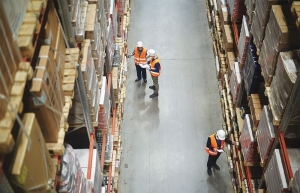Helping small businesses to support global supply chains
Supply chain finance is one of the fastest-growing segments of the financial world, but now it is time to add depth to the equation. We need to extend supply chain finance to the outer reaches of supply chains, to the small companies that provide the bulk of jobs and growth in the developing world.
 |
| Steven Beck- Head, Trade and Supply Chain Finance Programne Asian Development Bank |
Supply chain finance comes in a variety of forms, but in essence it is a simple concept: use the credit standing and mutual dependence of supplier inputs of a company at the top of a supply chain to enable financing for companies lower down the chain. In this way, suppliers to large corporate buyers can get the cash flow they need to run continuous operations and expand, rather than wait to be paid by buyers, which stunts growth and productivity.
Although the idea was first initiated in the 1980s, supply chain finance has only really taken off in recent years. Global supply chain finance volumes have grown from $330 billion in 2015 to $1.8 trillion in 2021, with 2021 seeing 38 per cent growth on 2020 volumes.
The Americas have traditionally claimed the largest share of financing volume each year. However, 2021 saw the most substantial growth in Asia and Africa, which reported 43 and 40 per cent annual growth, respectively.
Supply chains are deep, complex, global networks, with the tier-1 supplier relying on several lower tiers to deliver a finished good to the end buyer. The lower down the chain, the more likely that tiers will be mostly composed of small- and medium-sized enterprises (SMEs).
This is particularly true for larger and more geographically dispersed supply chains which are said to have “long tails,” such as the construction, electronics, automobile, and apparel industries.
Although supply chain finance has been growing fast recently, the evidence suggests it has mostly benefitted tier-1 suppliers.
It is necessary to enter deep-tier supply chain finance, which potentially extends financing access down the chain to even the smallest suppliers. That is important, especially in Asia’s developing countries, where SMEs account for most jobs and growth. It is also essential for the supply chains themselves. As recent disruptions have shown, production difficulties at the smallest companies well down the chain can cause shortages and delays to products offered by some of the world’s largest companies.
In addition to closing financing gaps for smaller companies which will generate growth, jobs, and development, deep-tier supply chain finance opens the potential to make supply chains more transparent.
The data flow created through linking up the financing of players in the supply chain will mean greater knowledge of who is in the chain and how they do their work. Currently, large companies at the top of supply chains often have little or no information about the SMEs at the further end of the chain.
Those large companies may have pledged to protect the environment in their operations, and to run production without damaging labour exploitation. Still, promises are difficult to keep without full knowledge of who is in their supply chain. A greater understanding of supply chains will make it easier to monitor and incentivise companies when it comes to the environmental and social standards we want them to meet.
Of course, if implementing deep-tier supply chain finance were easy, it would already be in wide use. There are hurdles to its full implementation.
Those hurdles are similar to the issues that impede the adoption of digital technology throughout the trading world. Although supply chains and global trade often use cutting-edge technology to run their operations, much of global trade is still conducted in analogue fashion, with stacks of paper documents exchanged manually in every single transaction.
Countries must agree on what deep-tier supply chain finance entails and define its use in legislation. That legislation must work across borders, since supply chains are cross-border entities. Industry also needs to work out preferred deep-tier supply chain finance methods to narrow the range of what governments and regulators need to approve.
Our team at the trade and supply chain finance group has reached out to governments and industry leaders to move this innovative form of finance forward, with a white paper on the subject released in October 2022 and a working group formed in partnership with the Bankers Association for Finance and Trade.
It is difficult to think of another sector that has had such a hard time accessing credit. Some market segments, such as consumer credit and perhaps real estate, have arguably received too much credit, and we have all paid the price for that. The lack of credit for SMEs to participate in global trade stifles growth and makes supply chains much more vulnerable.
With some effort and attention, we can close that funding gap and drive transparency through supply chains to make them more resilient, green, and socially responsible. Deep-tier supply chain finance offers us a promising way forward.
| Trade and supply chain finance in Vietnam In Vietnam, the Asian Development Bank’s Trade and Supply Chain Finance Programme (TSCFP) works with 14 banks and supported over $2.2 billion in trade through over 3,200 transactions in 2022. In addition to filling market gaps, the objective of the initiative is to mobilise private sector capital and involvement in developing Asia: $1.6 billion of the $2.2 billion in trade supported through the TSCFP was co-financed by the private sector. The programme is promoting environmental, social, and governance standards in Vietnam by implementing environmental and social management systems in local banks, which will allow better risk management and promote sustainable transactions in the country. In this regard, it will increase support energy-transition imports for green equipment in Vietnam. The TSCFP is also helping local banks to implement supply chain finance, which is an excellent vehicle to support SMEs. To make global trade and supply chains more efficient, the TSCFP has initiatives to digitalise trade, including advocating adoption of the UN’s Model Law enabling recognition of e-documents. Without governments recognising certain electronic documents in law, trade cannot be digitalised. TSCFP activities in Vietnam include: -Guarantees and loans to boost trade and supply chains -Technical assistance to implement supply chain financing to support SMEs -A digital standards initiative to digitalise global trade to make supply chains more resilient and efficient, and to increase trade-led economic growth and job creation -Implementation of environmental and social standards. |
 | OECD Forum: partnerships for resilient and sustainable supply chains Ministers have proposed further strengthening supply chains between OECD and Southeast Asia to be sustainable, equitable, and mutually beneficial, according to a recent forum. |
 | The importance of integrating policy to shore up supply chains One of the most urgent potential threats to Vietnam’s continued economic growth comes from a sustainability issue that did not get much air time at the COP27 climate summit in Egypt in November - supply chains. |
 | Spillover effects of supply chains on future growth The trend of supply chains shifting from China to Vietnam in the past several years is confirmed to continue and if there are no crises in Asia-Pacific, this trend will continue for the next 10 years to come at least, though the shift from China to Vietnam will happen at different paces for different sectors. Electronics is probably the most impactful for the economy and the most fast-paced one. The situation in China has already pushed the big electronic players to find alternatives. |
 | Business integrity passport to global supply chains Experts are urging Vietnamese firms to incorporate integrity principles into their corporate governance since they believe business integrity would be the passport to global supply chains. |
What the stars mean:
★ Poor ★ ★ Promising ★★★ Good ★★★★ Very good ★★★★★ Exceptional
Related Contents
Latest News
More News
- State corporations poised to drive 2026 growth (February 03, 2026 | 13:58)
- Why high-tech talent will define Vietnam’s growth (February 02, 2026 | 10:47)
- FMCG resilience amid varying storms (February 02, 2026 | 10:00)
- Customs reforms strengthen business confidence, support trade growth (February 01, 2026 | 08:20)
- Vietnam and US to launch sixth trade negotiation round (January 30, 2026 | 15:19)
- Digital publishing emerges as key growth driver in Vietnam (January 30, 2026 | 10:59)
- EVN signs key contract for Tri An hydropower expansion (January 30, 2026 | 10:57)
- Vietnam to lead trade growth in ASEAN (January 29, 2026 | 15:08)
- Carlsberg Vietnam delivers Lunar New Year support in central region (January 28, 2026 | 17:19)
- TikTok penalised $35,000 in Vietnam for consumer protection violations (January 28, 2026 | 17:15)

 Tag:
Tag:




















 Mobile Version
Mobile Version